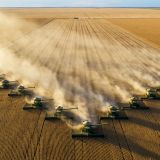George Steinmetz
Feed the Planet
Kirche St. Peter
Since the domestication of plants began some 11,000 years ago, humans have converted 40 percent of the earth’s surface into farmland. With the global population expected to reach 9.7 billion by the year 2050, combined with the rising standard of living in rapidly developing nations, it is estimated that we will have to double the global food supply. Feed the Planet is a ten-year project examining how the world can meet the rapidly expanding challenge of feeding humanity while protecting our natural environment and wildlife. In industrialised countries, most of us only come into contact with raw food in the supermarket and are unaware of the methods used to raise it. In many cases, the food industry goes to significant lengths to prevent us from seeing how our food is produced. Access to this information is central to the personal decisions we make about what we eat, which cumulatively has huge environmental impact. This project seeks to show how our food is produced, so that we can all make more informed decisions.
George Steinmetz is a documentary photographer based in New Jersey, who has shot more than 40 major photo essays for National Geographic. He has won three prizes from World Press Photo, the Environmental Vision award from Pictures of the Year, a citation from the Overseas Press Club, he was named National Geographic’s Adventurer of the Year in 2008 and he has a 1 million strong following on Instagram.
Best known for his aerial photography using both drones and a motorised paraglider, which enable George to capture unique images of places inaccessible by traditional aircraft. His restless curiosity for the unknown drove him to hitchhike across Africa as a young man and has been the drive behind his extraordinary body of work which covers remote landscapes, climate change and the global food supply.
Curated by Lois Lammerhuber / Printed by ![]()
Discover here contributions of ETH Zurich to the Sustainable Development Goal (SDG) 2:
Shaping food systems with agroecology
Kenza Benabderrazik
Dr. Kenza Benabderrazik grew up in Morocco, where food carries a rich cultural history and a strong connection to the land. The Moroccan mediterranean diet was shaped by the seasons and ecological conditions. Kenza experienced what was happening in the environment, through what landed on her plate.
At the EPFL in Lausanne, she studied environmental engineering, where started her fascination for the impacts that a good or a service could have over its life cycle on the environment.
How can a food system be resilient?
Through her studies in environmental engineering, Kenza became fascinated with the impacts that a good or a service within the food system could have on people and the environment over its full life cycle. Her research analyses the interconnections, tackling thorny issues such as how can systems be resilient in the face of climatic, market, political and other shocks.
Kenza always begins by posing questions on how to face crises, then how to adapt to them, and ultimately, how to transform the food system to become more resilient.
Her work focuses on how people who work along the food value chain are addressing shocks, highlighting the double burden on farmers who face both environmental and market pressures. She believes that the food and agricultural systems of the future need to be designed to be sustainable, equitable, and just. This requires making a transition to agroecology, while co-creating and sharing a common vision for our future food system by fostering dialogue between partners along the entire food value chain – from ecosystem services and farming to packaging, distributing and consuming food, as well as managing food waste.
Kenza works towards that goal by opening and cultivating social spaces that allow participants to share knowledge and practices on agroecology. She has also begun to engage in art and science collaborations in an effort to reach out to more people with these ideas, a move that reflects a deep connection with the history and culture of food shaped by early experiences in her native Morocco.
Agroecology for transformation
Kenza plans to engage more deeply in the political dimensions of how humans shape food systems. Part of this is about shedding light on different narratives, with a focus on acknowledging and addressing power asymmetries in our system. It is also about identifying potential alternatives – for example, could our food system be organised around cooperatives or decentralised unions and communities, rather than large corporations?
She is convinced that, to achieve Zero Hunger (SDG 2), food systems need to be seen through a decolonising and feminist lens that values diversity, empowerment, and engagement. Her vision is of a world where people are grounded in their actions, cultivating a sense of community that fosters and nourish a radical, sustainable and just transformation.
“Be courageous to see a better and brighter future, but also curious and open to pave the way.”
Dr. Kenza Benabderrazik, postdoctoral researcher and lecturer in the Sustainable Agroecosystems Group at ETH Zurich
A quest for alternative, affordable food
Alexander Mathys
Growing up on a farm gave Professor Alexander Mathys early insights into food production. Years later, after graduating from university and working in industry among other sectors, he specialised in research on sustainable food systems and food technologies.
Alexander’s work is driven by evidence that a predominantly meat-based diet contributes massively to environmental degradation by depleting resources and polluting the air, freshwater, and soil. The system of producing enough food to meet the needs of a growing population is also a major cause of environmental damage – and yet, the supply and distribution doesn’t reach everyone who needs it: as many as 828 million people around the world suffer from hunger.
It is extremely important for Alexander that his research serves everyone, especially people who already suffer from ongoing and worsening crises.
Sustainable, affordable, healthy food for all
As leader of the Sustainable Food Processing research team at ETH Zurich, Alexander is looking for alternatives to animal based food and animal feed that are more sustainable, affordable, and nutritious. He takes a systemic approach by looking at food production in the context of the entire value chain, considering social needs as well as environmental, economic, and social impacts.
This research has homed in on specific types of microalgae as promising sources of protein, and Alexander is now exploring more affordable ways of producing microalgae to help meet human food needs. He has also investigated the use of insects as a sustainable food for people and animals. Although the idea may now be unpalatable for many people, even bringing up feelings of disgust, insects are already part of the diet in many parts of the world, are high in protein, and can be grown more efficiently than traditional meat sources.
A meatless diet: the solution?
Alexander advocates for less animal protein in our diet. His research shows that this change in dietary habits can benefit the environment and social sustainability worldwide – hand-in-hand with ongoing efforts to make agricultural production more efficient through improvements in technology and policy.
Changing dietary habits may not mean the same thing everywhere. In regions such as several sub-Saharan Africa and South Asian regions, for example, it’s important to boost the intake of nutrient-rich foods in order to address essential nutrient deficiencies. But in North America and Europe, eating much less meat would be healthier for people and the planet. Changing dietary habits takes education, as well as lobbying to create favourable political conditions – to regulate environmentally harmful products, for example, while subsidising more environmentally friendly products.
Alexander believes that healthy and sustainable nutrition must not be a luxury.
“We need affordable new protein-rich foods in order to live healthily”
Alexander Mathys, Head of the Laboratory for Sustainable Food Processing at ETH Zurich
Joint land management pays off
Emmanuel Frossard
Professor Emmanuel Frossard studied and taught agricultural science in France and Canada before becoming Professor of Plant Nutrition at ETH Zürich in 1994. One of the bigger and more complex research projects Emmanuel implemented in his long and distinguished career involves building a transdisciplinary network of partners in West Africa.
Science-practice collaborations
Through the network, YAMSYS, Emmanuel and his partners address yam supply problems in West Africa. Yam is one of the most important economic crops in the region. Aside from generating income, it also has enormous nutritional and cultural value. But growing this staple degrades the environment and drives deforestation. This is because most of the increase in production is due to using up more land for cultivation, not increasing yields. The problem comes down to the quality of soil: without healthy soils, farmers clear ever more land to boost production – but if yam is grown in good soil conditions, it is possible to increase average yields from 8-10 to 40-50 tons per hectare. As the strategy of deforesting more land reaches its limits, it becomes clearer that if land is not being managed in a sustainable way, then that land will not be able to feed a growing population.
Emmanuel is convinced that tackling the problem depends on combining scientific fieldwork and a close collaboration with partners on the ground. Science can propose the best solutions – but if nobody implements them, they are simply useless. He believes that to make such collaborations work, the key is to establish trust in research methods and collaborative networks.
Keeping soils fertile for yam production
Emmanuel and his large research team explored how soil can be kept fertile and restored to grow yam sustainably. The researchers put land management strategies to the test – sometimes in rough conditions – and local farmers challenged them by granting access to land of poor quality. This meant that to earn their trust, the researchers had to prove they could grow yam sustainably in unfavorable conditions. The simple fact of having produced yam successfully on that soil convinced the farmers to adopt several of the scientists’ proposals, such as fertilization rotations, using mineral fertilizers, and growing their crops alongside leguminous plants to increase the level of nitrogen in the soil.
In the course of this work, Emmanuel continued to grow a network of farmers, local and religious authorities, politicians and even police in West Africa, bringing them together through four a so-called ‘innovation platform’ where knowledge gained through this project could be shared and discussed.
Progress needs time and diverse partners
The approach developed by YAMSYS has now been adopted by government-funded research and development programmes in Côte d’Ivoire, the United States, France, and Germany, among others. In another sign of its impact, one of the students who worked with YAMSYS has become minister of agriculture in Burkina Faso. Being recognised by West African countries and beyond is a huge recognition of what Emmanuel and his research partners have achieved.
“We must think in terms of transformative research that provides solutions and ideas on how to move the food system more towards food sustainability.”
Prof. Dr. Emmanuel Frossard, Chair of the Plant Nutrition group at ETH Zurich
open your eyes festival buerau
Botenaustrasse 42
9443 Widnau
Switzerland
Phone: +41 44 218 11 03




